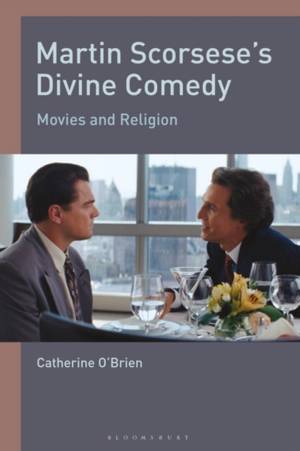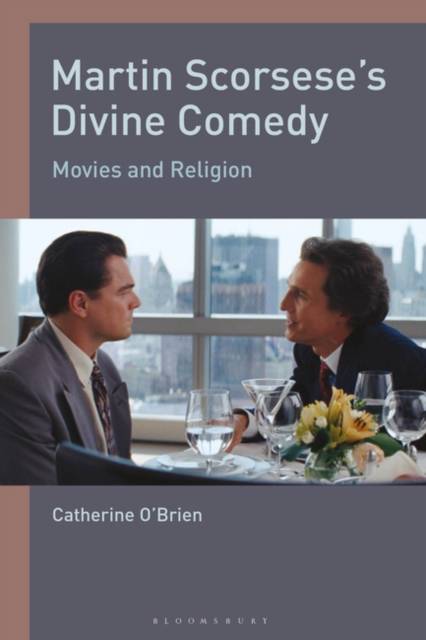
Je cadeautjes zeker op tijd in huis hebben voor de feestdagen? Kom langs in onze winkels en vind het perfecte geschenk!
- Afhalen na 1 uur in een winkel met voorraad
- Gratis thuislevering in België vanaf € 30
- Ruim aanbod met 7 miljoen producten
Je cadeautjes zeker op tijd in huis hebben voor de feestdagen? Kom langs in onze winkels en vind het perfecte geschenk!
- Afhalen na 1 uur in een winkel met voorraad
- Gratis thuislevering in België vanaf € 30
- Ruim aanbod met 7 miljoen producten
Zoeken
Martin Scorsese's Divine Comedy Movies and Religion
Movies and Religion
Catherine O'Brien
Paperback | Engels
€ 79,95
+ 159 punten
Omschrijving
This book is open access and available on www.bloomsburycollections.com. It is funded by Knowledge Unlatched.
Catherine O'Brien draws on the structure of Dante Alighieri's Divine Comedy to explore Martin Scorsese's feature films from Who's That Knocking at My Door(1967-69) to Silence(2016). This is the first full-length study to focus on the trajectory of faith and doubt during this period, taking very seriously the oft-quoted words of the director himself: 'My whole life has been movies and religion. That's it. Nothing else.' Films discussed include GoodFellas, The Last Temptation of Christ, Taxi Driverand Mean Streets, as well as the more recent The Wolf of Wall Street.
In Dante's poem in 100 cantos, the Pilgrim is guided by the poet Virgil down through the circles of Hell in Inferno; he then climbs the steep Mountain of the Seven Deadly Sins in Purgatory; and he finally encounters God in Paradise. Embracing this popular analogy, this study envisions Scorsese as a contemporary Dante, with his filmic oeuvre offering the dimensions of a cinematic Divine Comedy.
Drawing on debates at the heart of religious studies, theology, literature and film, this book goes beyond existing explorations of religion in Scorsese's work to address issues of sin and salvation within the context of wider debates in eschatology and the afterlife.
Catherine O'Brien draws on the structure of Dante Alighieri's Divine Comedy to explore Martin Scorsese's feature films from Who's That Knocking at My Door(1967-69) to Silence(2016). This is the first full-length study to focus on the trajectory of faith and doubt during this period, taking very seriously the oft-quoted words of the director himself: 'My whole life has been movies and religion. That's it. Nothing else.' Films discussed include GoodFellas, The Last Temptation of Christ, Taxi Driverand Mean Streets, as well as the more recent The Wolf of Wall Street.
In Dante's poem in 100 cantos, the Pilgrim is guided by the poet Virgil down through the circles of Hell in Inferno; he then climbs the steep Mountain of the Seven Deadly Sins in Purgatory; and he finally encounters God in Paradise. Embracing this popular analogy, this study envisions Scorsese as a contemporary Dante, with his filmic oeuvre offering the dimensions of a cinematic Divine Comedy.
Drawing on debates at the heart of religious studies, theology, literature and film, this book goes beyond existing explorations of religion in Scorsese's work to address issues of sin and salvation within the context of wider debates in eschatology and the afterlife.
Specificaties
Betrokkenen
- Auteur(s):
- Uitgeverij:
Inhoud
- Aantal bladzijden:
- 224
- Taal:
- Engels
Eigenschappen
- Productcode (EAN):
- 9781350141605
- Verschijningsdatum:
- 28/11/2019
- Uitvoering:
- Paperback
- Formaat:
- Trade paperback (VS)
- Afmetingen:
- 156 mm x 234 mm
- Gewicht:
- 317 g

Alleen bij Standaard Boekhandel
+ 159 punten op je klantenkaart van Standaard Boekhandel
Beoordelingen
We publiceren alleen reviews die voldoen aan de voorwaarden voor reviews. Bekijk onze voorwaarden voor reviews.









